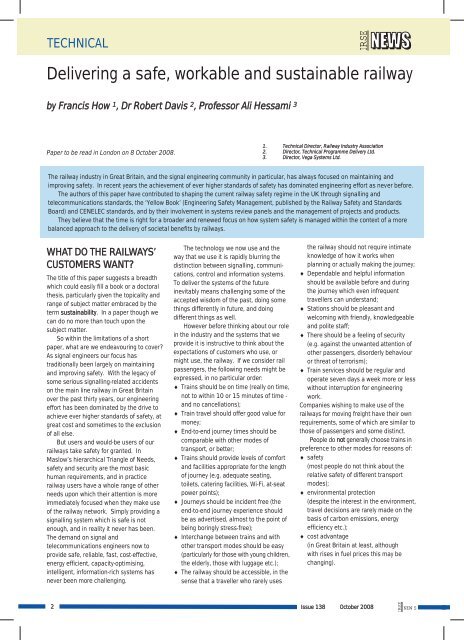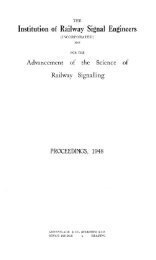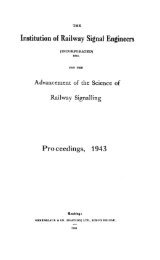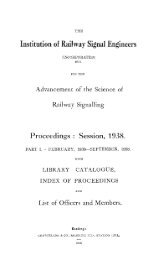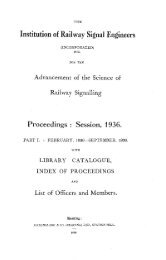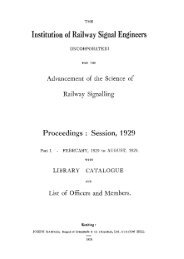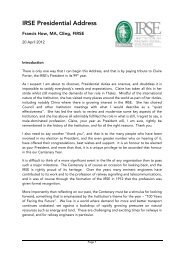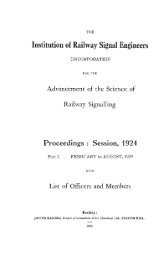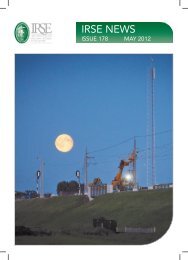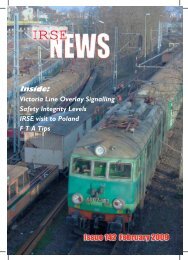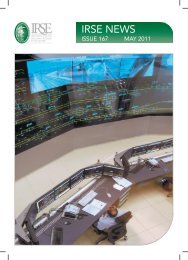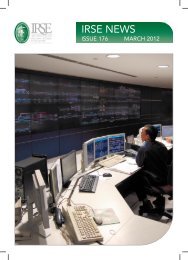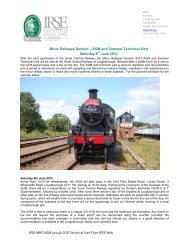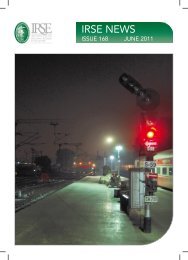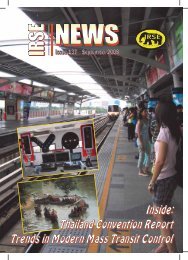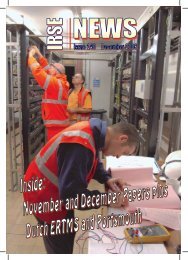IRSE News 138 Oct 08.pdf
IRSE News 138 Oct 08.pdf
IRSE News 138 Oct 08.pdf
You also want an ePaper? Increase the reach of your titles
YUMPU automatically turns print PDFs into web optimized ePapers that Google loves.
TECHNICAL<br />
<strong>IRSE</strong><br />
Delivering a safe, workable and sustainable railway<br />
by Francis How 1 , Dr Robert Davis 2 , Professor Ali Hessami 3<br />
Paper to be read in London on 8 <strong>Oct</strong>ober 2008.<br />
1. Technical Director, Railway Industry Association<br />
2. Director, Technical Programme Delivery Ltd.<br />
3. Director, Vega Systems Ltd.<br />
The railway industry in Great Britain, and the signal engineering community in particular, has always focused on maintaining and<br />
improving safety. In recent years the achievement of ever higher standards of safety has dominated engineering effort as never before.<br />
The authors of this paper have contributed to shaping the current railway safety regime in the UK through signalling and<br />
telecommunications standards, the ‘Yellow Book’ (Engineering Safety Management, published by the Railway Safety and Standards<br />
Board) and CENELEC standards, and by their involvement in systems review panels and the management of projects and products.<br />
They believe that the time is right for a broader and renewed focus on how system safety is managed within the context of a more<br />
balanced approach to the delivery of societal benefits by railways.<br />
WHAT DO THE RAILWAYS’<br />
CUSTOMERS WANT?<br />
The title of this paper suggests a breadth<br />
which could easily fill a book or a doctoral<br />
thesis, particularly given the topicality and<br />
range of subject matter embraced by the<br />
term sustainability. In a paper though we<br />
can do no more than touch upon the<br />
subject matter.<br />
So within the limitations of a short<br />
paper, what are we endeavouring to cover?<br />
As signal engineers our focus has<br />
traditionally been largely on maintaining<br />
and improving safety. With the legacy of<br />
some serious signalling-related accidents<br />
on the main line railway in Great Britain<br />
over the past thirty years, our engineering<br />
effort has been dominated by the drive to<br />
achieve ever higher standards of safety, at<br />
great cost and sometimes to the exclusion<br />
of all else.<br />
But users and would-be users of our<br />
railways take safety for granted. In<br />
Maslow’s hierarchical Triangle of Needs,<br />
safety and security are the most basic<br />
human requirements, and in practice<br />
railway users have a whole range of other<br />
needs upon which their attention is more<br />
immediately focused when they make use<br />
of the railway network. Simply providing a<br />
signalling system which is safe is not<br />
enough, and in reality it never has been.<br />
The demand on signal and<br />
telecommunications engineers now to<br />
provide safe, reliable, fast, cost-effective,<br />
energy efficient, capacity-optimising,<br />
intelligent, information-rich systems has<br />
never been more challenging.<br />
The technology we now use and the<br />
way that we use it is rapidly blurring the<br />
distinction between signalling, communications,<br />
control and information systems.<br />
To deliver the systems of the future<br />
inevitably means challenging some of the<br />
accepted wisdom of the past, doing some<br />
things differently in future, and doing<br />
different things as well.<br />
However before thinking about our role<br />
in the industry and the systems that we<br />
provide it is instructive to think about the<br />
expectations of customers who use, or<br />
might use, the railway. If we consider rail<br />
passengers, the following needs might be<br />
expressed, in no particular order:<br />
Trains should be on time (really on time,<br />
not to within 10 or 15 minutes of time -<br />
and no cancellations);<br />
Train travel should offer good value for<br />
money;<br />
End-to-end journey times should be<br />
comparable with other modes of<br />
transport, or better;<br />
Trains should provide levels of comfort<br />
and facilities appropriate for the length<br />
of journey (e.g. adequate seating,<br />
toilets, catering facilities, Wi-Fi, at-seat<br />
power points);<br />
Journeys should be incident free (the<br />
end-to-end journey experience should<br />
be as advertised, almost to the point of<br />
being boringly stress-free);<br />
Interchange between trains and with<br />
other transport modes should be easy<br />
(particularly for those with young children,<br />
the elderly, those with luggage etc.);<br />
The railway should be accessible, in the<br />
sense that a traveller who rarely uses<br />
the railway should not require intimate<br />
knowledge of how it works when<br />
planning or actually making the journey;<br />
Dependable and helpful information<br />
should be available before and during<br />
the journey which even infrequent<br />
travellers can understand;<br />
Stations should be pleasant and<br />
welcoming with friendly, knowledgeable<br />
and polite staff;<br />
There should be a feeling of security<br />
(e.g. against the unwanted attention of<br />
other passengers, disorderly behaviour<br />
or threat of terrorism);<br />
Train services should be regular and<br />
operate seven days a week more or less<br />
without interruption for engineering<br />
work.<br />
Companies wishing to make use of the<br />
railways for moving freight have their own<br />
requirements, some of which are similar to<br />
those of passengers and some distinct.<br />
People do not generally choose trains in<br />
preference to other modes for reasons of:<br />
safety<br />
(most people do not think about the<br />
relative safety of different transport<br />
modes);<br />
environmental protection<br />
(despite the interest in the environment,<br />
travel decisions are rarely made on the<br />
basis of carbon emissions, energy<br />
efficiency etc.);<br />
cost advantage<br />
(in Great Britain at least, although<br />
with rises in fuel prices this may be<br />
changing).<br />
2<br />
Issue <strong>138</strong> <strong>Oct</strong>ober 2008<br />
<strong>IRSE</strong><br />
NEWS


